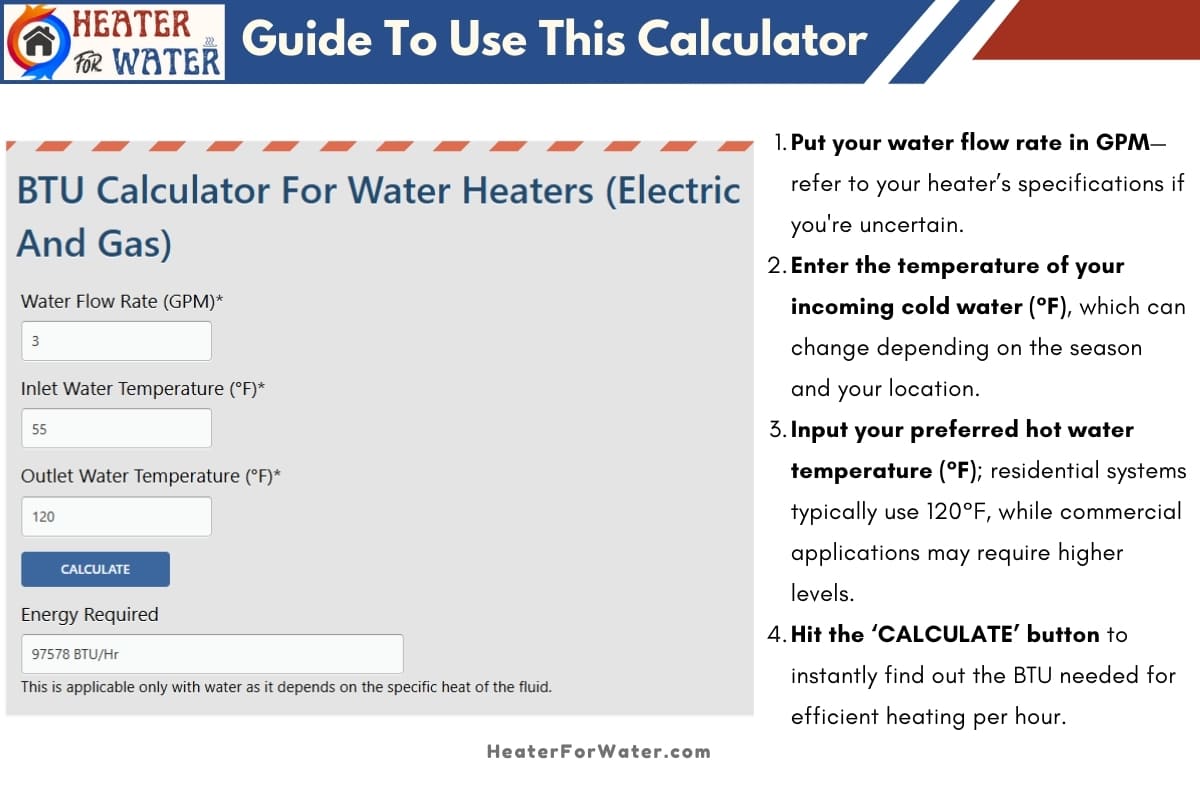Are you tired of dealing with cold showers or lukewarm baths? Wondering if your water heater is up to the task of meeting your household’s demands?
Understanding the right BTU (British Thermal Unit) for your water heater can make all the difference in ensuring a steady supply of hot water. But how do you calculate the BTU needs for your specific situation? That’s where a Water Heater BTU Calculator comes in handy.
This simple tool can save you from the hassle of trial and error, and help you find the perfect fit for your home’s hot water needs. Dive into this article to discover how you can optimize your water heater’s performance and never face another chilly shower again.
Page Contents
Importance Of Btu In Water Heaters
Understanding the importance of BTU in water heaters can transform how you experience hot water at home. BTU, or British Thermal Unit, measures the amount of heat needed to raise the temperature of one pound of water by one degree Fahrenheit. Knowing the right BTU for your water heater ensures efficiency and comfort in your daily routine. Imagine stepping into a warm shower on a cold morning, the water perfectly heated without waiting endlessly. That’s the power of the right BTU!
Role Of Btu In Heating
BTU plays a crucial role in determining how quickly your water heater can heat water. A higher BTU rating means faster heating, which is essential for large households or frequent use. Picture hosting a holiday gathering with guests vying for a shower—your water heater’s BTU rating ensures nobody’s left shivering. Understanding the BTU helps you choose a heater that matches your needs, keeping your home comfortable and efficient.
Impact On Energy Efficiency
Choosing the right BTU not only affects heating speed but also impacts energy efficiency. A water heater with a BTU rating that matches your usage can save energy, reducing utility bills. Think about the monthly savings when your heater isn’t working overtime to heat excess water. An efficient BTU rating means less energy waste, contributing to a greener environment and a lighter wallet. Are you optimizing your heater for both comfort and savings?
Consider checking your current water heater’s BTU and comparing it to your actual needs. This small step can lead to significant improvements in comfort and efficiency. What changes can you make today for a better tomorrow?
Calculating Btu Requirements
Understanding BTU requirements is vital for choosing the right water heater. BTU stands for British Thermal Unit. It measures energy output. Knowing your home’s BTU needs ensures efficiency. It also saves on energy costs.
Factors Affecting Btu Calculation
Several factors influence BTU calculation. First, consider the size of your household. More people mean more hot water demand. Second, think about your climate. Colder areas require more energy to heat water. Third, consider your water heater’s efficiency. High-efficiency models use fewer BTUs. Lastly, consider your usage habits. Frequent showers increase BTU needs.
Steps To Calculate Btu
First, determine your household’s daily water usage in gallons. Next, find the temperature rise needed. Subtract the incoming water temperature from the desired output temperature. Multiply the daily water usage by the temperature rise. Finally, divide by the heater’s efficiency factor. The result gives you the BTU requirement.
Types Of Water Heaters And Their Btu Ratings
Choosing the right water heater can be a daunting task, especially when you consider the BTU ratings. BTU, or British Thermal Units, is a measure of energy that tells you how much heat your water heater can produce. Understanding the different types of water heaters and their BTU ratings is crucial for ensuring you have enough hot water for your needs without overspending on energy.
Gas Water Heaters
Gas water heaters are a popular choice due to their efficiency and quick heating capabilities. They typically have higher BTU ratings compared to their electric counterparts, often ranging from 30,000 to 80,000 BTUs. This makes them ideal for larger households or those with high hot water demands.
Imagine this: You love taking long showers but hate waiting for the water to heat up. A gas water heater could be your solution. However, remember that higher BTUs mean more energy consumption, which could impact your energy bill.
Electric Water Heaters
Electric water heaters are known for their simplicity and ease of installation. They have lower BTU ratings, usually between 12,000 and 50,000 BTUs. This makes them more suitable for smaller homes or apartments with moderate hot water usage.
Think about your daily routine. If you mostly use hot water for quick showers and washing dishes, an electric water heater might be perfect for you. Plus, they often have a lower upfront cost, saving you money initially.
Tankless Water Heaters
Tankless water heaters, also known as on-demand water heaters, are gaining popularity due to their energy efficiency. They don’t store hot water; instead, they heat it as needed, with BTU ratings ranging from 15,000 to 199,000 BTUs.
Consider the convenience of endless hot water. If you have a busy household with staggered shower times, a tankless water heater could be a game-changer. However, the initial cost can be higher, so weigh the long-term savings on energy bills against the upfront investment.
Choosing the right water heater involves balancing your household needs with energy efficiency. Have you considered how your choice could affect your lifestyle and budget? Understanding BTU ratings can help you make an informed decision. What type of water heater suits your home best?

Credit: heaterforwater.com
Tips For Optimizing Energy Efficiency
Maximizing the energy efficiency of your water heater not only saves you money but also contributes to a greener environment. Understanding how to calculate and optimize BTU (British Thermal Unit) can significantly impact your energy consumption. Let’s dive into some practical tips to enhance your water heater’s efficiency.
Choosing The Right Btu
Selecting the appropriate BTU for your water heater is crucial. A unit with too high a BTU will waste energy, while one that’s too low may struggle to meet your needs. Consider the size of your household and typical water usage. For a family of four, a water heater around 30,000 BTU might be ideal.
Assess your daily routines. If you have frequent guests or use hot water for multiple tasks simultaneously, you might need a higher BTU. Reflect on your needs, not just the manufacturer’s recommendations.
Regular Maintenance Practices
Consistent upkeep is key to maintaining energy efficiency. Sediment buildup can insulate the heating element, making your heater work harder. Drain your tank annually to prevent this.
Check the temperature settings. Lowering it to 120°F can save energy without sacrificing comfort. Inspect the anode rod regularly, as it helps prevent corrosion, extending the life of your heater.
Energy-saving Technologies
Modern water heaters come with features that enhance efficiency. Look for models with heat pump technology, which use less energy by transferring heat rather than generating it. This can cut your energy use by up to 50%.
Smart thermostats offer precise control over your heater’s operation. They learn your patterns and adjust settings for optimal efficiency. Have you considered investing in a hybrid water heater that combines traditional heating with solar power? It’s an innovative way to reduce your carbon footprint.
Are you ready to make your water heater more efficient? Implement these tips and notice the difference in your energy bills and environmental impact.
Benefits Of Optimizing Btu
Optimizing the BTU (British Thermal Units) of your water heater can bring several advantages. A well-calculated BTU ensures your water heater runs efficiently and saves you money. It also contributes positively to the environment. Let’s explore the key benefits of optimizing BTU in your water heater.
Cost Savings
Reducing energy waste means lower utility bills. A properly optimized BTU ensures your water heater uses energy efficiently. This results in significant savings over time. You won’t pay for excess energy that goes unused. An efficient BTU calculation helps in reducing operating costs. Less energy usage translates to more money in your pocket.
Environmental Impact
Optimizing BTU helps in decreasing your carbon footprint. Efficient energy use means burning fewer fossil fuels. This leads to reduced greenhouse gas emissions. A well-optimized water heater is eco-friendly. It supports a sustainable environment by conserving energy. Small changes in BTU can make a big difference for the planet.
Enhanced Performance
A balanced BTU ensures your water heater performs at its best. It provides consistent hot water without strain. This reduces the risk of frequent breakdowns. Proper BTU levels maintain the heater’s lifespan. You enjoy uninterrupted hot water supply with fewer repairs. Your water heater runs smoothly and efficiently.

Credit: www.advantageengineering.com

Credit: hvacsimplified.in
Frequently Asked Questions
How Do I Calculate Btu For My Water Heater?
To calculate BTU, you need to know the water volume and temperature rise. Multiply the water volume (in gallons) by 8. 3 (weight of a gallon of water in pounds). Then multiply by the desired temperature increase. This gives you the BTU required to heat the water.
Why Is Btu Important For Water Heaters?
BTU measures the energy needed to heat water. It’s crucial for determining heater efficiency and capacity. The right BTU ensures your water heater can effectively meet your household’s hot water demands without wasting energy or causing delays.
What Factors Affect Water Heater Btu Requirements?
Several factors influence BTU needs, including water volume, desired temperature rise, and heater efficiency. Insulation, ambient temperature, and usage patterns also play roles. Accurately assessing these factors helps choose a suitable water heater for your needs, maximizing efficiency and performance.
Can A Water Heater Have Too Many Btus?
Yes, a water heater with too many BTUs can be inefficient. It may heat water too quickly, leading to energy waste. An oversized unit can cause short cycling, reducing lifespan. Choosing the right BTU level ensures efficient and cost-effective operation.
Conclusion
Calculating water heater BTU is simple with the right tools. Understand your needs first. Measure your space and hot water demand. Choose a calculator that suits these needs. This helps find the right water heater size. No guesswork. Accurate calculations ensure efficient heating.
Save money on energy bills. Enjoy consistent hot water. Use reliable calculators for best results. Check your measurements twice. Avoid errors. Efficient heaters last longer. They heat water quickly. You feel the difference. Comfort improves. Your home stays warm. Make informed decisions.
Choose the right BTU for peace of mind.
